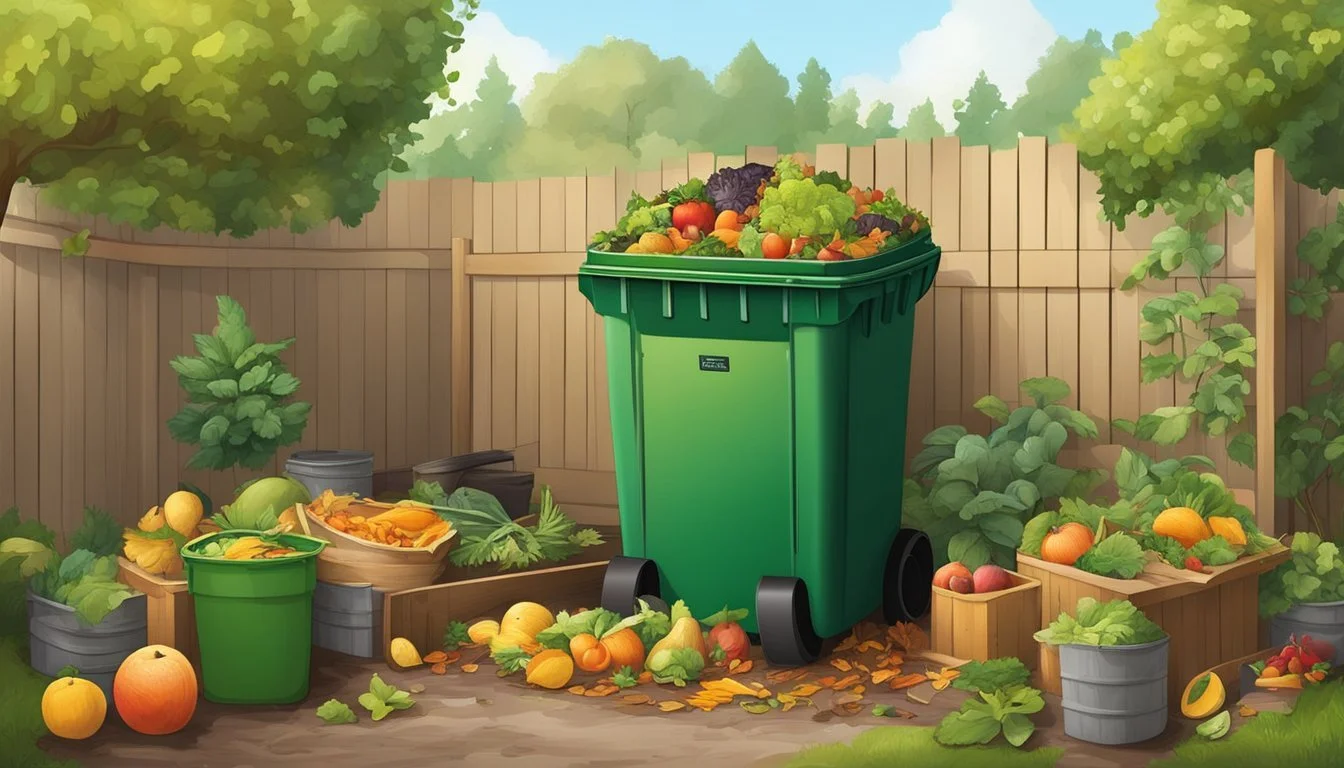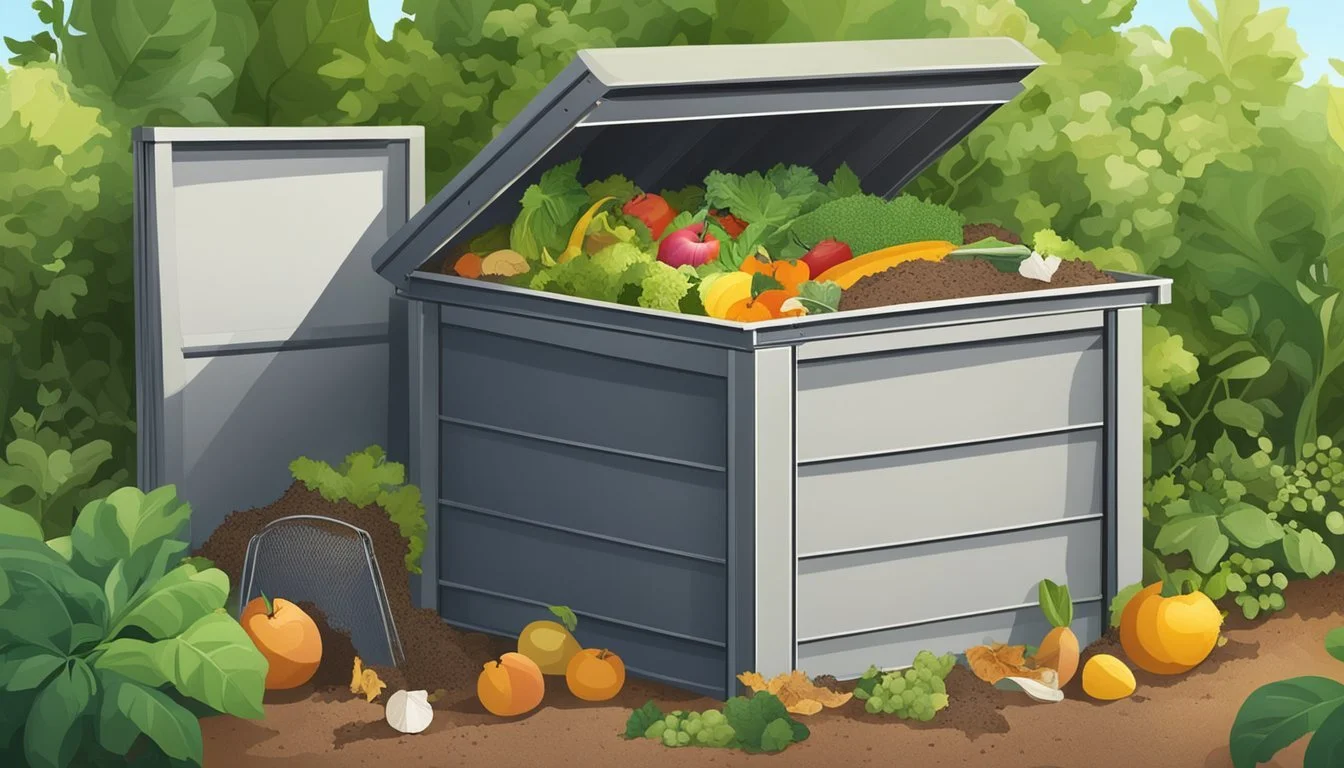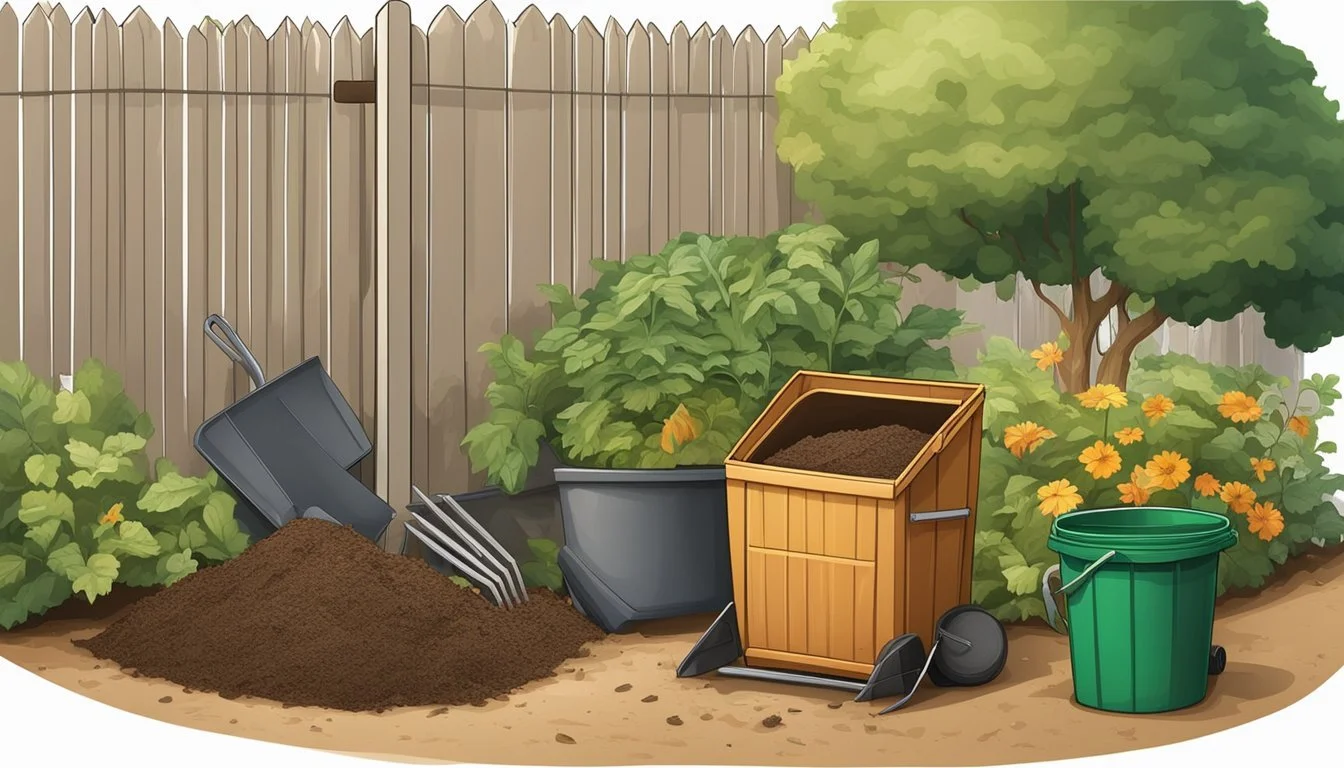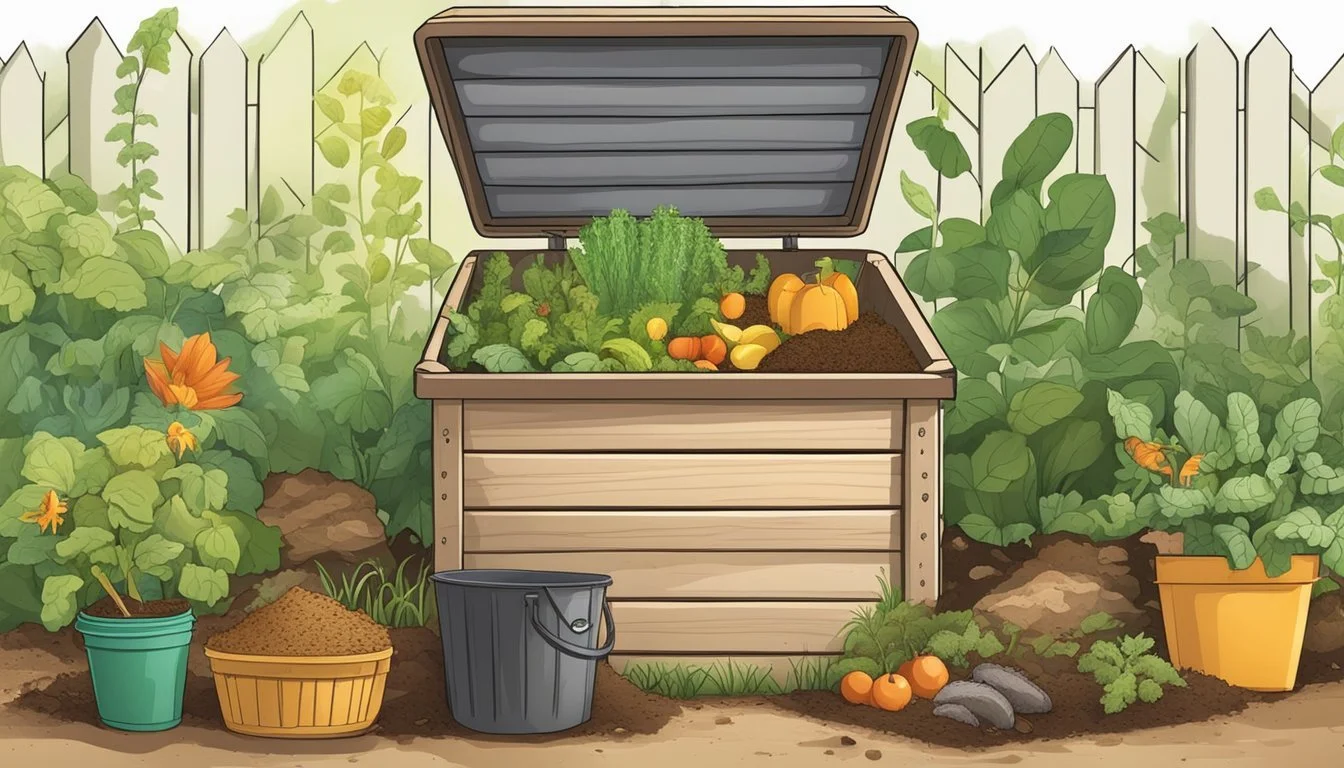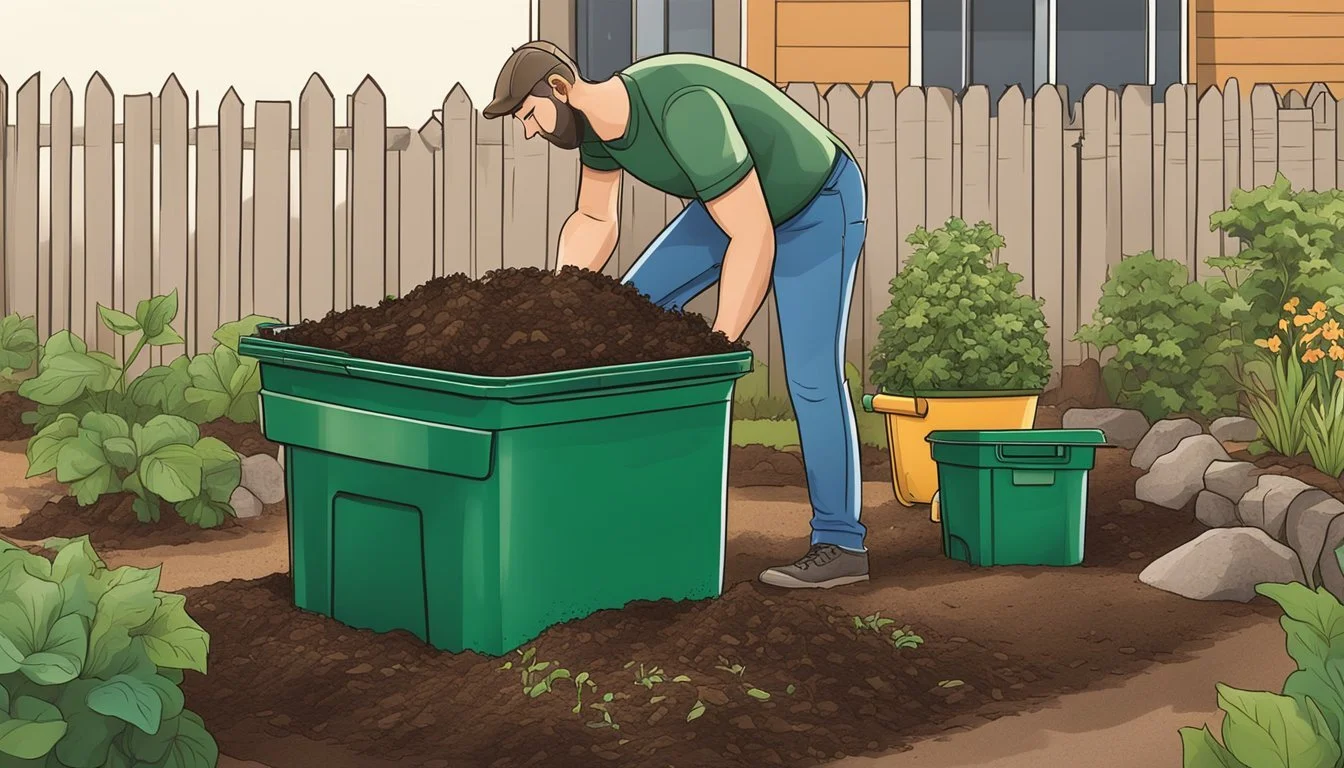Guide to Composting in Lewisville, TX
Tips for Effective Waste Reduction
Composting in Lewisville, Texas, represents a simple yet impactful way for residents and businesses to contribute positively to the environment. This practice involves the recycling of organic matter, such as food scraps and yard waste, into a nutrient-rich soil amendment, beneficial for gardening, landscaping, and agricultural use. With the city's commitment to sustainability, composting initiatives are well-supported, offering an accessible means for individuals to reduce the amount of waste sent to landfills, lowering greenhouse gas emissions and promoting soil health.
In Lewisville, a variety of services and resources are available to assist those interested in starting or improving their composting efforts. Local nurseries and supply stores provide necessary materials while some businesses offer services for food composting, making it easier for both residential and commercial clients to manage their organic waste effectively. Educational resources are also available to guide beginners through the process and help them understand the benefits of composting for soil enrichment and erosion control.
Through local action such as composting, Lewisville residents can play a crucial role in preserving natural resources and promoting sustainable practices within their community. It's not just about reducing waste; it's a step toward fostering a healthier ecosystem for current and future generations. By embracing composting, Lewisville is enabling its citizens to make significant environmental strides on both local and global scales.
Composting Basics
Composting is a natural process that transforms organic material into a rich soil amendment known as compost. In Lewisville, TX, residents can engage in composting to enrich their soil, reduce waste, and support a healthy garden ecosystem.
Starting a Compost Pile To begin, one needs an outdoor space where a pile or bin can be placed. For efficient breakdown, the pile should typically be at least 3 feet by 3 feet. Layers of organic materials such as fallen leaves, grass clippings, vegetable scraps, and other yard waste are added. These materials are categorized into "browns" and "greens," which provide carbon and nitrogen, respectively, essential elements for decomposition.
Browns include:
Dried leaves
Straw
Wood chips
Greens include:
Fruit and vegetable scraps
Coffee grounds
Fresh grass clippings
Maintaining the Pile For optimal decomposition, the compost pile needs to maintain balance between moisture, carbon, and nitrogen. It should be kept as moist as a wrung-out sponge to encourage microbial activity. Turning the pile occasionally introduces oxygen, another critical component for successful composting.
Decomposition Process Under the right conditions, microorganisms break down the organic material. Over time, this process results in compost, which is dark, crumbly, and earthy-smelling, indicating that it is ready to be used to improve garden soil.
By following these basic guidelines, individuals and communities in Lewisville can create valuable compost to enhance their soil, leading to healthier plants and more sustainable gardening practices.
Benefits of Composting
Composting offers a range of advantages for both gardeners and the environment in Lewisville, TX. One significant benefit is the creation of nutrient-rich soil that can greatly enhance the growth of plants in a garden. Compost acts as a natural fertilizer, providing essential nutrients like nitrogen, phosphorus, and potassium, which are vital for plant health.
The use of compost can also improve soil structure. It promotes increased soil aeration, better drainage, and improved water retention, making the soil more arable and suitable for various types of plants. This improvement in soil quality can lead to healthier plants and higher yields.
From an economic standpoint, residents in Lewisville can save money by composting at home. It reduces the need for costly chemical fertilizers and soil amendments. Furthermore, by turning kitchen scraps and yard waste into compost, they engage in an effective form of recycling, which minimizes the amount of waste sent to landfills.
Finally, composting supports the local ecosystem. It encourages beneficial microorganisms and earthworms, which play a crucial role in maintaining a healthy, balanced soil ecosystem.
Nutrient-Rich: Enhances plant growth, replaces need for synthetic fertilizers.
Soil Improvement: Boosts aeration, drainage, and water retention
Cost Effective: Lowers garden upkeep expenses by using household organic waste
Recycling: Reduces landfill waste, promoting environmental sustainability
Organic Waste Management
Organic waste management in Lewisville, TX, revolves around transforming biodegradable waste materials into a valuable resource for soil enrichment. Composting is a central component of this process, focusing on the breakdown of organic matter into a nutrient-rich soil amendment, ideally suited for gardening and landscaping.
Residents can compost a variety of organic materials:
Food Scraps: Fruits, vegetables, and eggshells enrich compost bins.
Leaves: These are an excellent source of carbon, which balances the nitrogen from food scraps.
Coffee Grounds: Nitrogen-rich and perfect for composting.
Dairy Products: Generally avoided to prevent odor and pests.
Food Waste: Most non-meat food waste can be composted.
Cardboard: Shredded cardboard acts as a brown material, providing carbon.
Napkins & Paper Towels: If unsoiled by oil or chemicals, these can be composted.
Meat Products: Excluded from composting due to potential pathogens and pests.
Yard Waste: Grass clippings and plant trimmings are ideal green materials.
Kitchen Scraps: Most scraps, excluding meat and dairy, can be composted.
Do Compost Avoid Composting Fruits and vegetables Dairy Leaves Meat Coffee grounds Diseased plants Eggshells Pet wastes Grass clippings Oily substances
Lewisville encourages residents to engage in composting practices, reducing landfill contributions of organic waste while simultaneously enhancing their gardens. By understanding what can and cannot be included, individuals contribute to a sustainable, community-wide effort in organic waste management.
Setting Up Your Compost Pile
Creating a compost pile in Lewisville, TX, involves gathering and managing organic waste that decomposes into rich soil amendment, beneficial for gardens and landscaping. Here's how to start:
Location: Choose an accessible spot that maintains warmth and is convenient for adding materials and turning the pile. Ideal placement ensures the pile receives partial sunlight to stay warm without drying out.
Foundation: Begin with a layer of coarse material, like small branches or sticks, to improve drainage and aerate the base. This helps introduce oxygen that microbes need to break down the materials.
Balancing Materials:
Brown materials such as dry leaves, twigs, or straw are rich in carbon and provide energy for the microbes.
Green materials like vegetable peelings, fruit waste, and grass clippings supply nitrogen, key for building the cell structure of new organisms.
A proper ratio of 2/3 browns to 1/3 greens by volume promotes an effective balance. Ensuring the materials are mixed and not layered thickly will aerate the pile and speed up the composting process.
Moisture: The pile should be as damp as a wrung-out sponge. If it's too dry, add water; if too moist, add more brown materials.
Maintenance: Regularly turn the pile with a pitchfork or shovel to aerate it and evenly distribute moisture and heat, essential for decomposition.
By attentively managing these elements, residents of Lewisville can foster a thriving compost pile that converts waste to mixture of nutrient-rich compost for enhancing garden soils.
Composting Techniques
Composting in Lewisville, TX, can be achieved through various methods, each with its own benefits. The end goal is to turn organic waste into a nutrient-rich soil amendment that enhances garden health.
Pile Composting: The most basic form is simply piling yard debris, food scraps, and organic material in a designated area. Maintaining a balance between greens, like kitchen scraps, and browns, such as dry leaves, is crucial for effective decomposition.
Using a Compost Tumbler: A compost tumbler is a sealed container that can be easily turned. This method speeds up the composting process through frequent aeration and mixing, which a person might do with a shovel. It is recommended to turn the compost tumbler once a week to maintain proper aeration.
Aeration: Vital for composting, it encourages microbial activity and reduces unpleasant odors. Whether using a shovel or a tumbler, introducing air is key.
Compost Tea: This nutrient-rich liquid is made by steeping finished compost in water. Applying compost tea to plants provides a quick boost of nutrients and beneficial microbes.
Method Description Tools Needed Pile Composting Simple, no-container method that relies on natural breakdown. Shovel for turning Tumbler Faster method with easier aeration and mixing. Compost tumbler Compost Tea Liquid amendment for immediate nutrient supply. Bucket, compost
Choosing the right technique depends on one's personal preference, space, and the amount of waste available. By employing these techniques, individuals in Lewisville can efficiently recycle organic material and contribute to a healthier environment.
Troubleshooting Common Issues
When composting in Lewisville, TX, gardeners may encounter a few common issues. It is crucial to address these promptly to maintain a healthy composting process.
Odors: A balanced compost should not emit a foul smell. If an unpleasant odor is present, this could indicate too much moisture or an imbalance between greens (nitrogen-rich materials) and browns (carbon-rich materials). To rectify this, one can adjust the green to brown ratio by adding more browns like dried leaves or cardboard to the pile.
Pests: Uninvited guests like rodents and flies are often attracted to open composts. To deter pests, ensure that food scraps are well-covered with browns and use a compost bin with a lid.
Earthworms: These creatures are beneficial to compost, aiding in the breakdown of organic material. If the compost is too dry, earthworms may not thrive. Maintaining adequate moisture will encourage their presence.
Moisture Levels: A compost pile should feel like a wrung-out sponge. If it is too wet, add more browns to absorb the excess moisture. Conversely, if the compost is too dry, sprinkle water over the pile to achieve the desired consistency.
Dust: A dusty compost indicates excessive dryness. Spraying the compost with water can help settle the dust and improve moisture content for optimal microorganism activity.
Fat: Avoid adding fats or oils to your compost as they can cause odor problems and attract pests. They also break down slowly, which can impede the overall composting process.
Remember, the decomposition process is driven by microorganisms that require a balance of materials, moisture, and air circulation to function effectively. Regular turning and monitoring are the keys to maintaining a healthy and efficient compost system.
Composting in Lewisville
Composting is a sustainable practice embraced by the community in Lewisville, Texas. It serves as a natural method for residents to manage yard waste and organics, converting them into valuable fertilizer that enriches the soil. Local initiatives make composting accessible and emphasize its role in waste reduction.
Services for Residents: Lewisville residents have several options for composting. In addition to doing it in their own backyards, they can utilize services such as Cowboy Compost, which support both residential and commercial composting efforts.
DIY Composting: Many residents turn their yard waste, such as leaves and grass clippings, into compost. Useful tips for maintaining an efficient compost pile include ensuring proper aeration to prevent bad odors and keeping the pile moist like a damp sponge.
Recycling Services: For those who prefer not to compost at home, local recycling centers often offer drop-off services for organic waste, which is then turned into compost.
Educational Resources: The city provides resources for those looking to start composting or improve their technique. Keep Lewisville Beautiful offers events such as the Garden Secrets series, aimed at educating the public on the best composting practices.
In summary, composting in Lewisville is a testament to the city's commitment to sustainability. Through a combination of community, educational resources, and dedicated services, the residents of Lewisville are empowered to contribute to a greener future.
Environmental Impact and Sustainability
Composting, the process of recycling organic matter into nutrient-rich soil, has a significant impact on environmental sustainability in Lewisville, TX. By converting organic waste into compost, the city can reduce landfill usage, thus diminishing greenhouse gas emissions that are typically produced from organic matter decomposition in landfills.
Landfill Reduction: Composting reduces the need for landfills. Organic waste, when composted, is kept out of landfills, consequently lowering the volume of waste in these facilities.
Soil Health: The use of compost improves soil structure, helping to prevent erosion by binding soil particles and increasing water retention.
Soil Benefits Description Nutrient-rich Composts provide essential nutrients to the soil, which may reduce the dependence on chemical fertilizers. Microbial Growth They promote the growth of beneficial microbes, essential for a healthy ecosystem.
Carbon Sequestration: Composting serves as a carbon sink. Organic materials that are composted become carbon-rich soil amendments. This process captures carbon, reducing the overall carbon footprint.
Water Conservation: Healthier soil retains water more effectively, which means less water is required for maintaining landscapes and gardens.
The City of Lewisville's initiatives encourage residents to engage in composting, forming part of their commitment to the Lewisville 2025 Plan. This plan aims to foster sustainability through various programs, asserting the benefits of composting as a method of conservation and a way to improve air quality.
Composting is a practical approach in Lewisville, aiding the environment while contributing to the city's sustainability efforts. It mitigates adverse ecological impacts and enhances the quality of life for its residents.
Advanced Composting Topics
When diving into more sophisticated composting techniques, several integral practices deserve focus. To create a nutrient-rich fertilizer for a Lewisville garden, a thorough understanding of these methods can significantly enhance the compost's efficacy.
Aerating the Pile: Ensuring adequate air circulation within a compost pile is crucial to maintain the proper decomposition rate and avoid unpleasant odors, as detailed by the Lewisville Environmental Programs Office.
Compost Tea: This liquid derivative of compost is an excellent way to infuse your plants with a gentle, nutrient-rich solution. One can make compost tea by steeping finished compost in water, creating a biologically active concoction that helps suppress foliar diseases and introduces beneficial microorganisms to the soil.
Layering for Success:
Greens: Material rich in nitrogen such as grass clippings and food scraps.
Browns: Carbon-rich matter like dry leaves, branches, and paper.
Balance: Maintaining a proper green-to-brown ratio accelerates decomposition and enriches the compost.
Mulching: Mulch, often applied as a soil cover, can be fortified with compost for additional benefits. It aids in retaining moisture, suppressing weeds, and gradually incorporating organic matter into the soil's surface layer.
Using fertilizers in conjunction with compost can meet specific nutritional requirements of plants. However, gardeners should apply them judiciously, as excessive use can harm the beneficial biota within the compost and subsequently the soil.
Incorporating these advanced composting practices not only enriches the garden but also contributes to ecologically sound waste management in the Lewisville community.
Engaging with the Community
Lewisville, TX, has a strong commitment to sustainability and environmental stewardship, exemplified through various initiatives that involve the community in composting practices. By engaging residents, gardeners, and businesses, the city fosters a culture of yard waste reduction and resource recovery.
Residents can participate in community composting programs that help divert waste from landfills. The City of Lewisville Environmental Programs Office provides guidelines for maintaining effective compost piles, ensuring that participants manage their compost with proper aeration to avoid bad odors.
Gardeners in Lewisville are encouraged to incorporate composting into their gardening routine. By doing so, they enrich their soil and sustain plant health, ultimately contributing to greener, more lush gardens.
Local businesses, especially those generating organic waste, have the opportunity to collaborate with city-led programs. They can reduce their environmental impact by turning potential waste into valuable compost.
Entity How to Engage Residents Join city composting initiatives, learn proper composting techniques. Gardeners Use compost to improve garden soils and share knowledge. Businesses Partner with the city for organic waste composting solutions.
Workshops and educational materials are available to ensure everyone has the knowledge necessary to participate effectively. This collaborative approach not only helps the environment by reducing greenhouse gas emissions from decaying waste but also fosters a sense of community and shared responsibility.
Composting Regulations in Lewisville
Residents of Lewisville, Texas, interested in composting should be aware that specific regulations govern these activities to ensure environmental compliance and public health. The City of Lewisville's Trash and Recycling Information provides guidelines on composting practices within the city limits.
Local Guidelines:
Composting must not attract pests or create a nuisance for neighbors.
Compost bins should be maintained in a sanitary manner.
Placement of composting systems should comply with city zoning and not interfere with public services.
State and Federal Oversight: In addition to local guidelines, residents must also adhere to the state and federal regulations. The Texas Commission on Environmental Quality (TCEQ) outlines general requirements for composting, which encompass air quality and overall environmental considerations. It is crucial to note that all composting operations in Texas are subject to these state rules.
Environmental Protection Agency (EPA): While the EPA provides comprehensive information on composting benefits and best practices, actual enforcement of regulations is typically handled at the state and local level. However, any composting activities that could potentially impact water or air quality must comply with established EPA standards.
Lewisville residents are encouraged to engage in composting as a sustainable waste management practice, but they should do so in accordance with all applicable laws and guidelines to ensure they are contributing positively to their community and the environment.
Additional Resources and Support
Residents seeking to enhance their composting knowledge in Lewisville, TX, can access a variety of resources. The website Take Care of Texas offers insightful Basics of Composting providing practical steps to start and maintain a compost pile effectively.
For tips on compost use, one can examine How to Use Compost. To ensure successful composting, it is crucial to avoid the use of treated seed and harmful chemicals that can contaminate the compost and ultimately the soil.
In addition, individuals looking for composting support closer to Fort Worth and Austin have access to local environmental programs promoting sustainable practices including composting.
To further aid residents, below is a straightforward list of steps to commence composting:
Select a suitable spot for your compost pile or bin.
Gather green and brown materials; green for nitrogen, brown for carbon.
Maintain moisture levels, keeping the pile damp but not soaked.
Turn your pile every few weeks to aerate it.
Those unable to compost at home can still support organic waste reduction by contacting Keep Midland Beautiful, which provides information on Composting - Nature's Way To Recycle, emphasizing compost's role in reducing soil erosion and its benefits to plant health.
For people inclined towards local commerce, businesses listed on platforms like Yelp, such as those found near Lewisville, TX 75029, offer compost and related products for those seeking ready-made solutions.

